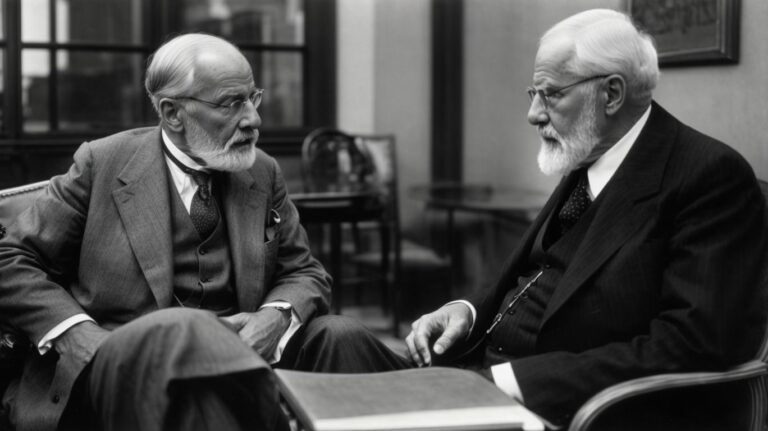Robert Rescorla is a prominent figure in the field of psychology, known for his groundbreaking theories that have had a significant impact on our understanding of learning and behavior.
In this article, we will explore the key concepts of Rescorla’s theory, including classical conditioning, contingency theory, prediction error theory, and stimulus substitution theory. We will also examine how his theory differs from other prominent theories in the field, and the various applications and criticisms of his work.
Whether you are a psychology enthusiast or simply curious about human behavior, this article will provide valuable insights into the work of Robert Rescorla.
Contents
- 1 Key Takeaways:
- 2 Who Is Robert Rescorla?
- 3 What Are the Key Concepts of Rescorla’s Theory?
- 4 How Did Rescorla’s Theory Differ from Other Theories?
- 5 What Are the Applications of Rescorla’s Theory?
- 6 What Are the Criticisms of Rescorla’s Theory?
- 7 Frequently Asked Questions
- 7.1 What is Robert Rescorla’s contribution to psychology?
- 7.2 How did Robert Rescorla’s research on classical conditioning differ from previous theories?
- 7.3 What is the Rescorla-Wagner model?
- 7.4 How did Rescorla’s research impact the field of psychology?
- 7.5 What are some real-world applications of Rescorla’s research?
- 7.6 What is the current status of Rescorla’s contribution to psychology?
Key Takeaways:
- Robert Rescorla’s theory of classical conditioning is based on the concept of contingency, which states that the association between a conditioned and unconditioned stimulus is strengthened when the conditioned stimulus reliably predicts the occurrence of the unconditioned stimulus.
- Unlike other theories of learning, Rescorla’s theory emphasizes the importance of the organism’s prediction of the outcome of a stimulus, rather than the actual outcome itself.
- Rescorla’s theory has practical applications in various fields such as therapy, advertising, and animal training, making it a valuable contribution to psychology that has real-world implications.
Who Is Robert Rescorla?
Robert A. Rescorla, a prominent psychologist known for his groundbreaking work in Pavlovian conditioning, was a distinguished figure at the University of Pennsylvania, where his research and teaching significantly shaped the field of animal learning and cognitive processes.
Early in his life, Rescorla developed a passion for psychology, leading him to pursue his education at the University of Pennsylvania, where he completed his undergraduate studies.
He then went on to earn his Ph.D. in psychology from the University of Cambridge under the mentorship of Nicholas Mackintosh, making significant contributions to the understanding of Pavlovian conditioning.
His remarkable career unfolded as he joined the faculty at Yale University, where his innovative research flourished.
Notably, his influential work on predictability and the contingency model has remained a landmark in psychological science.
What Are the Key Concepts of Rescorla’s Theory?
Key concepts of Rescorla’s theory encompass the intricate dynamics of Pavlovian conditioning, as well as the influential Rescorla-Wagner model, shedding light on the principles of associative learning and their implications for cognitive processes.
Rescorla’s theory introduces the fundamental understanding of how organisms acquire knowledge and behavioral responses through associative learning, primarily through the lens of Pavlovian conditioning.
This premise centers on the process by which a neutral stimulus becomes associated with a significant one, eliciting a conditioned response.
The Rescorla-Wagner model articulates the computational principles underlying this phenomenon, emphasizing the role of expectation and prediction error in shaping the strength of conditioning.
This model underscores the dynamic interplay between stimuli and outcomes, offering valuable insights into how cognitive processes are influenced by anticipatory associations.
Classical Conditioning
Classical conditioning, also referred to as Pavlovian conditioning, plays a pivotal role in Rescorla’s theory, elucidating the intricate processes of associative learning and their significance in shaping animal behavior and cognitive processes.
Rescorla’s theory of classical conditioning involves the association between unconditioned stimuli (UCS) and conditioned stimuli (CS), resulting in learned responses.
The Rescorla-Wagner model expands on this concept by considering the prediction error and how unexpected events during conditioning can affect the strength of the association between stimuli.
This mechanism has implications not only for animal learning but also for cognitive processes such as attention, perception, and memory.
Contingency Theory
The contingency theory proposed by Rescorla sheds light on the intricate relationship between stimuli and responses, offering valuable insights into the underlying mechanisms of animal learning and their implications for cognitive processes.
Through his theory, Rescorla demonstrated the importance of predictive value in conditioning, asserting that organisms learn the relationship between stimuli and responses based on their predictive power.
His work has been influential in understanding how animals process and respond to environmental cues, paving the way for further discoveries in behavioral psychology and cognitive sciences.
Rescorla’s research and teachings have left a lasting impact on the field, providing a framework for examining the complexities of learning in both animals and humans.
Prediction Error Theory
The prediction error theory, a cornerstone of Rescorla’s work, provides a profound understanding of how unexpected events shape the learning process in animals, reflecting the depth of his contributions to the field and earning him prestigious accolades such as the Guggenheim Fellowship and recognition by the National Academy of Sciences.
The prediction error theory within Rescorla’s framework suggests that the difference between an organism’s expectation of an event and the actual occurrence of that event is crucial in influencing the learning process.
This theory has significant implications for animal learning and cognitive processes, illuminating how deviations from expected outcomes can have a profound impact on behavioral adaptation.
Rescorla’s influential publications, such as “Pavlovian Conditioning: It’s Not What You Think,” have delved deeply into this theory, unraveling its applications in various contexts and advancing the understanding of associative learning.
His meticulous research methodologies and theoretical insights have solidified his reputation as a pioneer in the field of behavioral psychology and animal cognition.
Stimulus Substitution Theory
Rescorla’s stimulus substitution theory offers a nuanced perspective on the transformation of neutral stimuli into conditioned stimuli, contributing to our understanding of cognitive processes and behavioral neuroscience, as evidenced by his influential publications in this domain.
This theory posits that in Pavlovian conditioning, the conditioned stimulus comes to substitute for the unconditioned stimulus, rather than simply serving as a signal for its occurrence.
It has significant implications for our comprehension of how associations are formed and processed in the mind, shedding light on the intricate workings of cognitive processes.
The impact of Rescorla’s theory extends to the field of behavioral neuroscience, providing a framework for investigating the neural mechanisms underlying learning and memory.
How Did Rescorla’s Theory Differ from Other Theories?
Rescorla’s theory distinguished itself from other prominent theories, including Pavlov’s classical conditioning, Thorndike’s Law of Effect, and Skinner’s operant conditioning, by offering a comprehensive framework that significantly advanced the understanding of animal learning and cognitive processes.
Unlike Pavlov’s classical conditioning, which focused primarily on the association between a neutral stimulus and a reflex response, Rescorla’s theory delved into the complexities of cognitive processes involved in learning. It proposed that learning was more than just the formation of associations.
Similarly, while Thorndike’s Law of Effect emphasized the relationship between behavior and its consequences, Rescorla’s theory extended beyond mere reinforcement and punishment.
It encompassed the cognitive aspects of animal learning, taking into account factors such as attention and prediction error.
In contrast to Skinner’s operant conditioning, which centered on the role of reinforcement in shaping behavior, Rescorla’s theory emphasized the significance of cognitive processes. These include attention and prediction error, in driving learning and behavior.
Rescorla’s seminal work paved the way for a deeper understanding of how animals acquire knowledge and adapt their behavior based on their cognitive representations of the world.
Pavlov’s Theory of Classical Conditioning
Pavlov’s theory of classical conditioning, while foundational, was expanded and refined by Rescorla’s comprehensive framework, reshaping the understanding of Pavlovian conditioning and its broader implications for animal learning and cognitive processes.
Rescorla’s framework introduced significant enhancements to classical conditioning theory, notably through the emphasis on the role of expectation in learning processes. This challenged the previously accepted view of the mere association between stimuli.
His work brought a fresh perspective to the conditioned stimulus-unconditioned stimulus relationship, highlighting the importance of cognitive factors, such as awareness and contingency, in the conditioning process.
These refinements revolutionized the understanding of animal learning and paved the way for the development of the influential Rescorla-Wagner model.
Thorndike’s Law of Effect
In comparison to Thorndike’s Law of Effect, Rescorla’s model offered a more comprehensive understanding of the intricate processes involved in animal learning and their implications for cognitive processes, influencing his research and teaching in significant ways.
Rescorla’s model focused on the idea that learning involves cognitive processes beyond mere associations between stimuli and responses. He proposed that animals form expectations and use these expectations to guide their behaviors.
This perspective highlighted the role of predictive learning and the influence of cognitive factors on behavior, which significantly enriched the understanding of animal learning.
Rescorla’s model also emphasized the importance of taking into account the reliability and informativeness of stimuli in associative learning, in contrast to the relative simplicity of Thorndike’s Law of Effect.
This approach provided a more nuanced understanding of the factors influencing the strength and stability of associations between stimuli and responses.
Skinner’s Theory of Operant Conditioning
Rescorla’s theory diverged from Skinner’s operant conditioning framework by providing unique insights into Pavlovian conditioning, the Rescorla-Wagner model, and their implications for animal learning and cognitive processes, as evidenced by his influential publications in this domain.
Rescorla’s approach to Pavlovian conditioning emphasized the crucial role of predictive learning and the association between stimuli. In contrast to Skinner’s focus on response consequences, Rescorla’s framework highlighted the predictive value of cues.
His influential work on the Rescorla-Wagner model showcased the concept of associative strength, revolutionizing our understanding of how animals form expectations and predict outcomes.
Rescorla’s contributions to cognitive processes were remarkable. He delved into the realm of expectancy and its impact on conditioning, shedding light on the intricate mechanisms of learning.
His pivotal studies not only advanced our comprehension of animal behavior, but also provided valuable insights into the human mind.
What Are the Applications of Rescorla’s Theory?
Rescorla’s theory found diverse applications, including the treatment of phobias, insights for advertising and marketing strategies, and its impact on animal training, reflecting the breadth of its influence across various domains.
In the context of treating phobias, Rescorla’s theory has influenced exposure therapy, which aims to reduce fear and anxiety by gradually exposing individuals to their feared stimulus in a controlled and safe environment. This helps them overcome their irrational fears.
In the realm of advertising and marketing, this theory’s emphasis on the predictive value of stimuli has led to the development of more effective advertising campaigns and branding strategies. By tapping into consumer behavior, it allows for the creation of impactful messages.
In the field of animal training, Rescorla’s principles have been instrumental in understanding how animals learn through conditioning, shaping behavior, and obtaining desired responses.
Treatment of Phobias
Rescorla’s theory offered valuable insights for the treatment of phobias, leveraging the principles of Pavlovian conditioning and the Rescorla-Wagner model to address the cognitive processes underlying fear responses and their potential therapeutic applications.
The application of Rescorla’s theory in treating phobias is rooted in its understanding of how individuals develop fear responses through associative learning, a central tenet of Pavlovian conditioning.
This theory also emphasizes the interplay of cognitive processes in shaping and maintaining phobias. By elucidating the mechanisms through which fear responses are acquired and sustained, Rescorla’s insights have encouraged the development of targeted interventions that aim to modify these learned associations and cognitive schemas.
Advertising and Marketing
In the realm of advertising and marketing, Rescorla’s theory offered valuable perspectives on the principles of Pavlovian conditioning, the Rescorla-Wagner model, and their implications for understanding consumer behavior and cognitive processes, influencing marketing strategies and campaigns.
Rescorla’s theory has been instrumental in elucidating how associative learning influences consumer behavior. It sheds light on the formation and modification of brand preferences.
By diving into the intricate workings of classical conditioning, Rescorla’s theory has allowed marketers to craft more effective stimuli and messages. These are tailored to trigger specific responses and associations in consumers.
The applications of Rescorla’s theory extend to the realm of cognitive processes. It provides insights into memory and attention mechanisms, guiding marketers in creating engaging and memorable advertising content.
Animal Training
Rescorla’s theory provided valuable insights for animal training, diving into the mechanisms of the Rescorla-Wagner model, animal learning, and their implications for cognitive processes, shaping innovative approaches in the field of animal training.
Rescorla’s theory has significant applications in understanding and manipulating stimulus contingencies in animal training. Trainers can optimize reinforcement schedules by comprehending how animals associate stimuli with outcomes, leading to improved learning outcomes.
Additionally, Rescorla’s insights into conditioned emotional responses have benefited trained animals by reducing stress and anxiety during training. This theory has also influenced the development of systematic desensitization techniques, allowing trainers to effectively alleviate animals’ fears and phobias.
What Are the Criticisms of Rescorla’s Theory?
While Rescorla’s theory garnered acclaim, criticisms arose, including concerns regarding the empirical evidence, the perceived overemphasis on contingency, and the limited generalizability of its principles, prompting critical evaluations of its applications and implications.
One of the primary criticisms of Rescorla’s theory is centered around the empirical evidence supporting its claims. Critics argue that the empirical backing for the theory is not as robust as claimed, with some studies yielding conflicting results.
Another point of contention is the perceived overemphasis on contingency. Some argue that this aspect of the theory may not adequately capture the complexity of real-world learning and behavior, leading to doubts about its practical applicability.
Concerns have been raised about the limited generalizability of its principles. Critics question the extent to which the theory’s findings can be extended to various contexts and populations, thus challenging its validity in diverse scenarios.
These criticisms have spurred ongoing debates within the academic community, encouraging researchers to further scrutinize the theory and its potential limitations.
Lack of Empirical Evidence
One of the primary criticisms of Rescorla’s theory pertained to the perceived lack of empirical evidence supporting certain aspects of the Rescorla-Wagner model, prompting discussions regarding its implications for animal learning, cognitive processes, and its impact on research and teaching in the field.
Detractors argue that the lack of robust empirical evidence for certain components of the Rescorla-Wagner model has raised skepticism about its explanatory power.
This has sparked debates within the scientific community, leading to a reconsideration of its application in understanding complex animal learning behaviors and cognitive processes.
The critique also extends to the research and teaching practices influenced by Rescorla’s theory, as educators and scholars have raised concerns about basing instruction and study designs on a model that lacks strong empirical support.
As a result, it has led to a call for more rigorous empirical validation and refinement of the Rescorla-Wagner model to ensure its continued relevance in the ever-evolving field of psychology and behavioral sciences.
Overemphasis on Contingency
Some critiques focused on the perceived overemphasis on contingency within Rescorla’s theory, raising discussions about its impact on Pavlovian conditioning, the Rescorla-Wagner model, and their implications for animal learning and cognitive processes.
The criticism surrounding the perceived overemphasis on contingency within Rescorla’s theory has prompted scholars to delve into the intricate layers of Pavlovian conditioning and the Rescorla-Wagner model.
This critical lens offers a deeper understanding of how contingency affects the complexities of animal learning and cognitive processes.
It reshapes the discourse on the interplay between stimuli and behavioral responses, shedding light on the nuances of associative learning and prediction error in the realm of animal behavior and cognition.
Limited Generalizability
Criticism regarding the limited generalizability of Rescorla’s theory prompted discussions about its implications for the Rescorla-Wagner model, animal learning, cognitive processes, and its impact on research and teaching in the field, reflecting on the scope and applicability of its principles.
This critique of the limited generalizability of Rescorla’s theory highlights concerns about the broad application of its principles. The implications reach beyond the theoretical framework and influence research practices, particularly in the context of animal learning and cognitive processes.
This has underscored the need for a comprehensive understanding of the factors that influence learning and behavior. It has led to a reevaluation of the methodologies employed in studying these phenomena.
Frequently Asked Questions
What is Robert Rescorla’s contribution to psychology?
Robert Rescorla is known for his groundbreaking research on classical conditioning and his development of the Rescorla-Wagner model, which explains the role of cognitive processes in learning and conditioning.
How did Robert Rescorla’s research on classical conditioning differ from previous theories?
Rescorla’s research challenged traditional views on classical conditioning, which focused solely on the relationship between a conditioned stimulus and an unconditioned stimulus. He argued that the predictability of the conditioned stimulus also played a major role in learning.
What is the Rescorla-Wagner model?
The Rescorla-Wagner model is a mathematical model that explains the role of cognitive processes, such as prediction and expectation, in classical conditioning. It suggests that the strength of conditioning depends on the predictability of the conditioned stimulus.
How did Rescorla’s research impact the field of psychology?
Rescorla’s research on classical conditioning and the Rescorla-Wagner model have had a significant impact on the field of psychology, providing a new perspective on the role of cognitive processes in learning and conditioning. This has led to further research and advancements in the understanding of these processes.
What are some real-world applications of Rescorla’s research?
Rescorla’s research has been applied in various fields, including education, advertising, and therapy. For example, understanding the predictability of stimuli can help educators create more effective learning experiences, and advertisers can use this knowledge to better influence consumer behavior.
What is the current status of Rescorla’s contribution to psychology?
Rescorla’s contribution to psychology is widely recognized and his work continues to be highly influential. The Rescorla-Wagner model is still used in research and has been integrated into many other theories and models in psychology.



